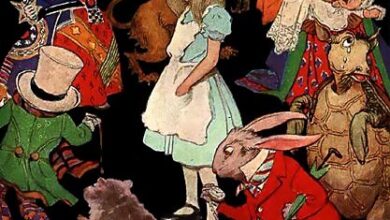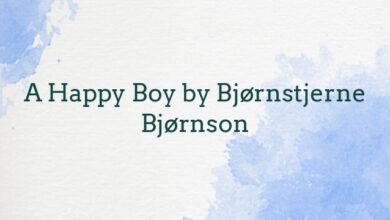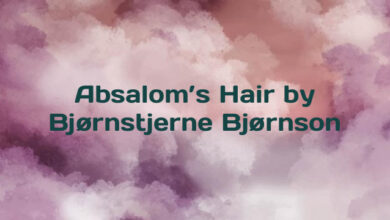
The Damned by Algernon Blackwood
Chapter VIII
And then, while that dreadful house stood listening about us in the early hours of this chill morning upon the edge of winter, she told me, with laconic brevity, things about Mabel that I heard as from a distance. There was nothing so unusual or tremendous in the short recital, nothing indeed I might not have already guessed for myself. It was the time and scene, the inference, too, that made it so afflicting: the idea that Mabel believed herself so utterly and hopelessly lost– beyond recovery damned.
That she had loved him with so passionate a devotion that she had given her soul into his keeping, this certainly I had not divined–probably because I had never thought about it one way or the other. He had “converted” her, I knew, but that she had subscribed whole-heartedly to that most cruel and ugly of his dogmas–this was new to me, and came with a certain shock as I heard it. In love, of course, the weaker nature is receptive to all manner of suggestion. This man had “suggested” his pet brimstone lake so vividly that she had listened and believed. He had frightened her into heaven; and his heaven, a definite locality in the skies, had its foretaste here on earth in miniature–The Towers, house, and garden. Into his dolorous scheme of a handful saved and millions damned, his enclosure, as it were, of sheep and goats, he had swept her before she was aware of it. Her mind no longer was her own. And it was Mrs. Marsh who kept the thought-stream open, though tempered, as she deemed, with that touch of craven, superstitious mercy.
But what I found it difficult to understand, and still more difficult to accept, was that, during her year abroad, she had been so haunted with a secret dread of that hideous after-death that she had finally revolted and tried to recover that clearer state of mind she had enjoyed before the religious bully had stunned her–yet had tried in vain. She had returned to The Towers to find her soul again, only to realize that it was lost eternally. The cleaner state of mind lay then beyond recovery. In the reaction that followed the removal of his terrible “suggestion,” she felt the crumbling of all that he had taught her, but searched in vain for the peace and beauty his teachings had destroyed. Nothing came to replace these. She was empty, desolate, hopeless; craving her former joy and carelessness, she found only hate and diabolical calculation. This man, whom she had loved to the point of losing her soul for him, had bequeathed to her one black and fiery thing–the terror of the damned. His thinking wrapped her in this iron garment that held her fast.
All this Frances told me, far more briefly than I have here repeated it. In her eyes and gestures and laconic sentences lay the conviction of great beating issues and of menacing drama my own description fails to recapture. It was all so incongruous and remote from the world I lived in that more than once a smile, though a smile of pity, fluttered to my lips; but a glimpse of my face in the mirror showed rather the leer of a grimace. There was no real laughter anywhere that night.
The entire adventure seemed so incredible, here, in this twentieth century–but yet delusion, that feeble word, did not occur once in the comments my mind suggested though did not utter. I remembered that forbidding Shadow too; my sister’s watercolors; the vanished personality of our hostess; the inexplicable, thundering Noise, and the figure of Mrs. Marsh in her midnight ritual that was so childish yet so horrible. I shivered in spite of my own “emancipated” cast of mind.
“There is no Mabel,” were the words with which my sister sent another shower of ice down my spine. “He has killed her in his lake of fire and brimstone.”
I stared at her blankly, as in a nightmare where nothing true or possible ever happened.
“He killed her in his lake of fire and brimstone,” she repeated more faintly.
A desperate effort was in me to say the strong, sensible thing which should destroy the oppressive horror that grew so stiflingly about us both, but again the mirror drew the attempted smile into the merest grin, betraying the distortion that was everywhere in the place.
“You mean,” I stammered beneath my breath, “that her faith has gone, but that the terror has remained?” I asked it, dully groping. I moved out of the line of the reflection in the glass.
She bowed her head as though beneath a weight; her skin was the pallor of grey ashes.
“You mean,” I said louder, “that she has lost her–mind?”
“She is terror incarnate,” was the whispered answer. “Mabel has lost her soul. Her soul is–there!” She pointed horribly below. “She is seeking it …?”
The word “soul” stung me into something of my normal self again.
“But her terror, poor thing, is not–cannot be–transferable to us!” I exclaimed more vehemently. “It certainly is not convertible into feelings, sights and–even sounds!”
She interrupted me quickly, almost impatiently, speaking with that conviction by which she conquered me so easily that night.
“It is her terror that revived ‘the Others.’ It has brought her into touch with them. They are loose and driving after her. Her efforts at resistance have given them also hope–that escape, after all, is possible. Day and night they strive.
“Escape! Others!” The anger fast rising in me dropped of its own accord at the moment of birth. It shrank into a shuddering beyond my control. In that moment, I think, I would have believed in the possibility of anything and everything she might tell me. To argue or contradict seemed equally futile.
“His strong belief, as also the beliefs of others who have preceded him,” she replied, so sure of herself that I actually turned to look over my shoulder, “have left their shadow like a thick deposit over the house and grounds. To them, poor souls imprisoned by thought, it was hopeless as granite walls–until her resistance, her effort to dissipate it–let in light. Now, in their thousands, they are flocking to this little light, seeking escape. Her own escape, don’t you see, may release them all!”
It took my breath away. Had his predecessors, former occupants of this house, also preached damnation of all the world but their own exclusive sect? Was this the explanation of her obscure talk of “layers,” each striving against the other for domination? And if men are spirits, and these spirits survive, could strong Thought thus determine their condition even afterwards?
So many questions flooded into me that I selected no one of them, but stared in uncomfortable silence, bewildered, out of my depth, and acutely, painfully distressed. There was so odd a mixture of possible truth and incredible, unacceptable explanation in it all; so much confirmed, yet so much left darker than before. What she said did, indeed, offer a quasi-interpretation of my own series of abominable sensations–strife, agony, pity, hate, escape–but so far-fetched that only the deep conviction in her voice and attitude made it tolerable for a second even. I found myself in a curious state of mind. I could neither think clearly nor say a word to refute her amazing statements, whispered there beside me in the shivering hours of the early morning with only a wall between ourselves and–Mabel. Close behind her words I remember this singular thing, however–that an atmosphere as of the Inquisition seemed to rise and stir about the room, beating awful wings of black above my head.
Abruptly, then, a moment’s common sense returned to me. I faced her.
“And the Noise?” I said aloud, more firmly, “the roar of the closing doors? We have all heard that! Is that subjective too?”
Frances looked sideways about her in a queer fashion that made my flesh creep again. I spoke brusquely, almost angrily. I repeated the question, and waited with anxiety for her reply.
“What noise?” she asked, with the frank expression of an innocent child. “What closing doors?”
But her face turned from grey to white, and I saw that drops of perspiration glistened on her forehead. She caught at the back of a chair to steady herself, then glanced about her again with that sidelong look that made my blood run cold. I understood suddenly then. She did not take in what I said. I knew now. She was listening–for something else.
And the discovery revived in me a far stronger emotion than any mere desire for immediate explanation. Not only did I not insist upon an answer, but I was actually terrified lest she would answer. More, I felt in me a terror lest I should be moved to describe my own experiences below-stairs, thus increasing their reality and so the reality of all. She might even explain them too!
Still listening intently, she raised her head and looked me in the eyes. Her lips opened to speak. The words came to me from a great distance, it seemed, and her voice had a sound like a stone that drops into a deep well, its fate though hidden, known.
“We are in it with her, too, Bill. We are in it with her. Our interpretations vary–because we are–in parts of it only. Mabel is in it–all.”
The desire for violence came over me. If only she would say a definite thing in plain King’s English! If only I could find it in me to give utterance to what shouted so loud within me! If only–the same old cry– something would happen! For all this elliptic talk that dazed my mind left obscurity everywhere. Her atrocious meaning, nonetheless, flashed through me, though vanishing before it wholly divulged itself.
It brought a certain reaction with it. I found my tongue. Whether I actually believed what I said is more than I can swear to; that it seemed to me wise at the moment is all I remember. My mind was in a state of obscure perception less than that of normal consciousness.
“Yes, Frances, I believe that what you say is the truth, and that we are in it with her”–I meant to say I with loud, hostile emphasis, but instead I whispered it lest she should hear the trembling of my voice– “and for that reason, my dear sister, we leave tomorrow, you and I– today, rather, since it is long past midnight–we leave this house of the damned. We go back to London.”
Frances looked up, her face distraught almost beyond recognition. But it was not my words that caused the tumult in her heart. It was a sound– the sound she had been listening for–so faint I barely caught it myself, and had she not pointed I could never have known the direction whence it came. Small and terrible it rose again in the stillness of the night, the sound of gnashing teeth. And behind it came another–the tread of stealthy footsteps. Both were just outside the door.
The room swung round me for a second. My first instinct to prevent my sister going out–she had dashed past me frantically to the door–gave place to another when I saw the expression in her eyes. I followed her lead instead; it was surer than my own. The pistol in my pocket swung uselessly against my thigh. I was flustered beyond belief and ashamed that I was so.
“Keep close to me, Frances,” I said huskily, as the door swung wide and a shaft of light fell upon a figure moving rapidly. Mabel was going down the corridor. Beyond her, in the shadows on the staircase, a second figure stood beckoning, scarcely visible.
“Before they get her! Quick!” was screamed into my ears, and our arms were about her in the same moment. It was a horrible scene. Not that Mabel struggled in the least, but that she collapsed as we caught her and fell with her dead weight, as of a corpse, limp, against us. And her teeth began again. They continued, even beneath the hand that Frances clapped upon her lips….
We carried her back into her own bedroom, where she lay down peacefully enough. It was so soon over…. The rapidity of the whole thing robbed it of reality almost. It had the swiftness of something remembered rather than of something witnessed. She slept again so quickly that it was almost as if we had caught her sleepwalking. I cannot say. I asked no questions at the time; I have asked none since; and my help was needed as little as the protection of my pistol. Frances was strangely competent and collected…. I lingered for some time uselessly by the door, till at length, looking up with a sigh, she made a sign for me to go.
“I shall wait in your room next door,” I whispered, “till you come.” But, though going out, I waited in the corridor instead, so as to hear the faintest call for help. In that dark corridor upstairs I waited, but not long. It may have been fifteen minutes when Frances reappeared, locking the door softly behind her. Leaning over the banisters, I saw her.
“I’ll go in again about six o’clock,” she whispered, “as soon as it gets light. She is sound asleep now. Please don’t wait. If anything happens I’ll call–you might leave your door ajar, perhaps.”
And she came up, looking like a ghost.
But I saw her first safely into bed, and the rest of the night I spent in an armchair close to my opened door, listening for the slightest sound. Soon after five o’clock I heard Frances fumbling with the key, and, peering over the railing again, I waited till she reappeared and went back into her own room. She closed her door. Evidently she was satisfied that all was well.
Then, and then only, did I go to bed myself, but not to sleep. I could not get the scene out of my mind, especially that odious detail of it which I hoped and believed my sister had not seen–the still, dark figure of the housekeeper waiting on the stairs below–waiting, of course, for Mabel.




